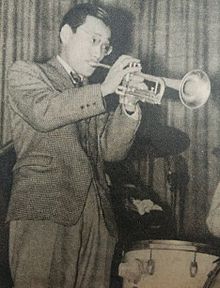Blue Japan: Authenticity of Japanese Jazz
Blue Japan: Authenticity of Japanese Jazz

"U.S. servicemen and their Japanese partners dance to jazz tunes in the newly opened Tokyo nightclub Oasis of the Ginza, circa 1945. (How Japan Came to Love Jazz, Jarrenwattananon)"
Listening to Jazz was one of the necessary luxury that a middle-class Japanese should have, because simply (there might be more reasons, but basically) it is Western and modern thing to do. Could the Japanese have the "soul" and "originality" when they play Jazz? How did Japanese respond to Jazz? How did the "original," American audiences and players respond to Japan's such obsession to Jazz? As these questions sparkled debates among elites of interwar Japan, Jazz was no longer just an alien musical genre, but also a symbol of all the confusion about Japan's national identity. Here, we will explore a bit about Jazz in interwar Japan, with the writing by Atkins E. Taylor and an online interview of him.
Can Jazz be "our nation's soul?"
Although Jazz prospered and took a large proportion in Japanese popular culture in the 1920s Japan, it wasn't easy from the start. Obviously, it was a symbol of westernizing Japan, and a representative of "alien culture." Post-earthquake Japan was going through numerous debates of beliefs and thoughts, and Jazz fitted well in those debates about what should be preserved and what should be modernized.
That often led to extreme situations, such as an incident that a dance instructor Tamura Kazuo was arrested for several sex scandals at Ginza hall. The media constantly highlighted that these dance instructors not only seduced waitresses and Geishas but also "the wives and daughters of physicians, corporate executives and social elites from Tokyo, Osaka and Chiba." The Age of Dance Hall Erotic Pleasures (1932) promoted a "sensationalized and unfavorable image" of jazz and social dance as "Western and hedonistic."
The fact is that jazz transforms people into drunkards and sex
maniacs, drives them mad, and causes civilized people to fall to
the level of the African jungle. Because of [ jazz] it is a fact that
divorce is increasing; it is also a fact that hothouse virgins
[onshitsu no shojo] are maturing ‘‘too fast’’; and generally
speaking it is also a fact that the revolution in male-female
relationships was brought about by jazz.—Murobuse Koshin,
Gaito no shakaigaku, 1929 (exerpted from Blue Nippon)
Do the Japanese really "understand" Jazz?
When jazz was first imported to Japan, it was no longer "music of the underprivileged," but a popular, trendy music for middle to upper-middle class. The main issue was if the Japanese, who don't even know the history or background of black music, can ever understand the "soul" of jazz sincerely- but just enjoying it on a surface level because they have to. This authenticity controversy of Japanese jazz is well represented with this quote by the members of the Art Ensemble of Chicago.
We have listened to performance by Japanese groups, but they are making music that stands atop Afro-American traditions. So it is not original. (...)
In the past we (black people) made music in Africa. We were making music in times of slavery. With the times it has progressed in different forms. Our (black) music moved with the world. If you (Japanese) don't start from this, you'll never create original work. It takes five hundred years.
(exerpted from Blue Nippon)
This, of course, did not receive positive responses from Japanese audiences. Some comments from saxophonist Branford Marsalis with a similar context were heavily criticized in Japan as well, that it is part of the prevalent "Japan bashing" in America. But there were mixed, neutral responses too; Murakami Haruki stated that the Japanese audience who listen to Jazz, rap, or blues should "appreciate them as more than music," and to "pay a bit more attention to the totality of the history and culture of black people in America."
Obviously, there were positive perspective towards Japanese audiences as well, because jazz was treated as high culture for Japanese and Japan was one of the biggest consumer of jazz music. But the controversy still remains for Japanese jazz players, who really have to express the "soul" in it.
Clearly, this notion of "Japanese can never understand jazz" can be part of Japanese exoticism. What Japanese does is exotic because they are- and should be- "Japanese." And a common stereotype of Japan as a "state of imitators" -sadly, many Japanese themselves believe in this too- took part. Iconic Japanese jazz players were often identified as a "Japanese version" of the American one: such as Fumio Nanri called as "Japan's Satchmo."
Trumpeter Fumio Nanri (1910~1975)
As Atkins argues in the book, authenticity is "problematic and hard to judge." Defining what "race" created one art genre and who "owns" can be very subjective, therefore should not be the standard to judge whether this "race" has the "soul."
But jazz's controversy over authenticity surely provided the Japanese public to debate about Japan's national identity in the interwar period, when modernity and tradition clashed was constantly clashing each other. To add, despite of the hardships it went through, jazz successfully remained it's status as popular, high culture in Japan, leaving many iconic Japanese jazz artists. (Although hip hop later continued this controversy)
And, of course, it is not only about an American music imported into Japan. Japanese themselves also have a strong notion of the "Japanese originality," such as "the westerners will never understand the spirit of Enka." You will now probably notice that authenticity of certain art genres relates deeply into many topics: racial identification, nationalism, modernity and tradition. It would always be interesting to think about it and apply it to whatever country, depending on where you came from.
Lastly, The video below is Soga Maoko singing "I'm a dreamer, aren't I?" with Columbia Jazz Band.
Atkins, E. Taylor. Blue Nippon: authenticating jazz in Japan. Duke University Press, 2001.

Comments
Post a Comment